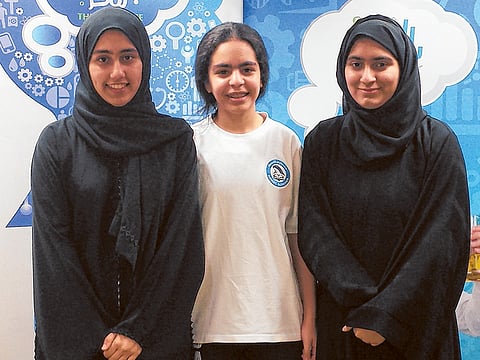Students to showcase innovative projects at Think Science
Upcoming competition pushes young minds to adopt innovation with easy applicability in daily life

Abu Dhabi: With this year’s Think Science competition slated to begin in April, workshops were held in Abu Dhabi explaining the judging process, and guidelines presented to participants on how best to prepare and plan for their projects.
Now in its third edition, the Think Science competition, organised by the Emirates Foundation, aims to encourage young people to get involved in science and technology, and come up with innovative solutions to modern-day challenges of living.
This year’s competition is set to be the biggest one yet, with more than 600 university and high school students participating and submitting more than 200 projects in the categories of electrical engineering, environmental sciences and management, physics and chemistry, and aerodynamics, among other categories.
Gulf News spoke with some of the students at the workshop about their upcoming projects. One project titled Cyclopure, devised by three students — Mai Hesham, 15, from Egypt, and Mariam Al Hammadi, 15, and Mariam Al Obaidly, 16, from Adnoc School, UAE — aims to purify water without the use of electricity.
“Unfortunately, many people don’t have access to clean drinking water around the world, so we came up with this idea,” said Hesham.
“The innovation here is that we purify water without the use of electricity. We use the pedalling action on a bicycle to create kinetic energy, which can be converted into electrical energy, which, in turn, powers the water pump to purify it,” explained Al Hammadi.
“This is a great opportunity to show everyone what young people can do,” she added.
Another innovative project called Find Me, developed by Shahad Naser Al Junaibi, 18, from the UAE, and a student from Umm Al Arab school in Abu Dhabi, helps with a problem all of us face sometime or the other — finding a lost item.
“I developed a sticker with a chip and a tracking device. The sticker can be placed on any item you wish — a mobile phone, passport or a bag. Through GPS, the item can be tracked. If, for example, you have misplaced your mobile phone, you will be able to track it through the sticker,” Al Junaibi said.
“Each sticker has a unique number, so once the person gets the sticker, they will note its number, create their profile [through our website] and when they need to track something, they go online, enter their registered details and immediately, they will be able to track down the sticker and the item,” Al Junaibi added.
Attending the same school, Shamma Saeed, 16, from the UAE, developed Saving Jacket, which installs a GPS device on life jackets.
“I came up with this idea after I saw a video about a man who was missing at sea for about a month until he was found dead. It distressed me and I decided to come up with way to for life jackets to have [a] GPS tracking device,” said Shama.
“The GPS tracker can be activated and connected with a person’s smartphone, so if someone has a family member going out to sea, they can connect with the GPS tracker on the life jacket through their mobile device, and it will give them the exact location of their loved one who is out at sea.” This will help reach out to the individual much faster in case of an emergency, she said.
“The coast guard can locate a person much quicker thanks to the GPS tracker, because the quicker you can locate someone who is lost at sea, the better the chances for their survival,” she added.
Key facts about Think Science competition:
— It’s held under the Patronage of Shaikh Abdullah Bin Zayed Al Nahyan, UAE Foreign Minister.
— Registration open for people between the ages of 15-24.
— Competition will be judged by 50 to 60 judges from industries and academia.
— The judging process starts from April 17 to 19.
— Winners of the competition will be announced at an award ceremony in May.
![Social media claims of cancellations dismissed; official updates to be shared through authorised channels. [Illustrative image]](http://media.assettype.com/gulfnews%2F2025-11-15%2Fx2mp12df%2Fexam.jpg?w=320&auto=format%2Ccompress&fit=max)


